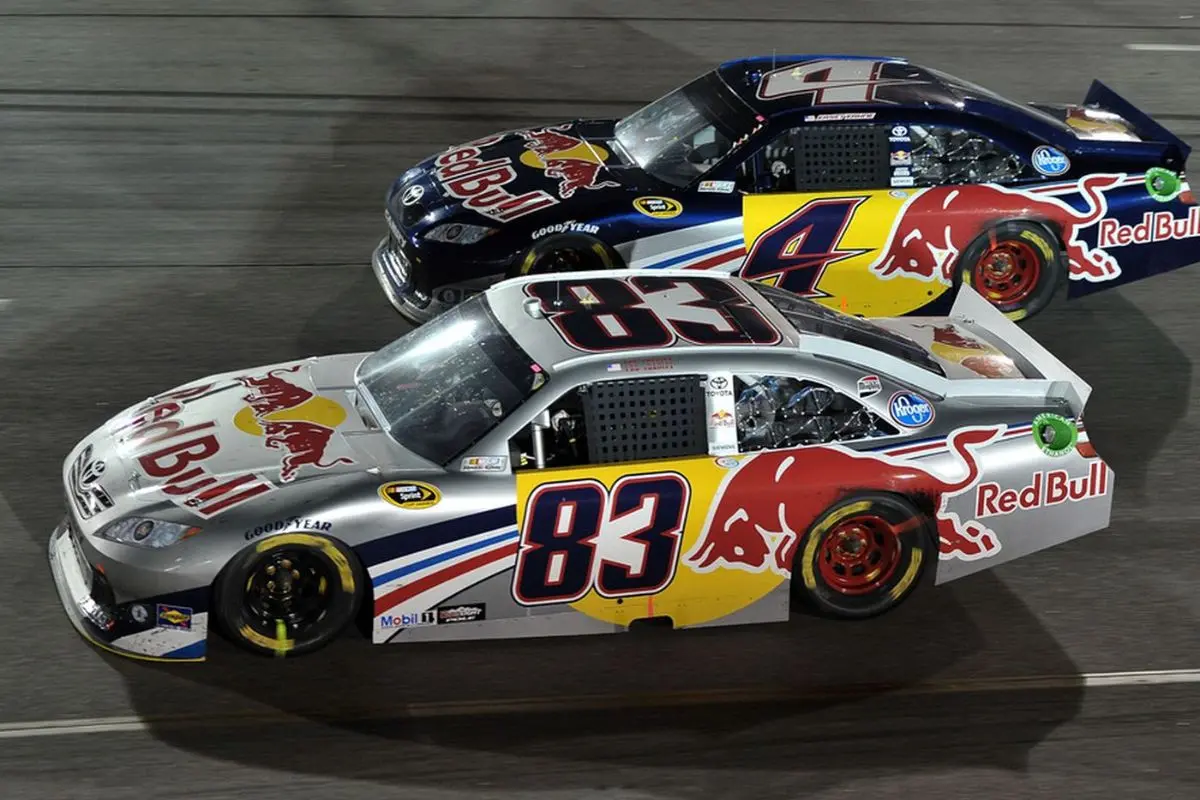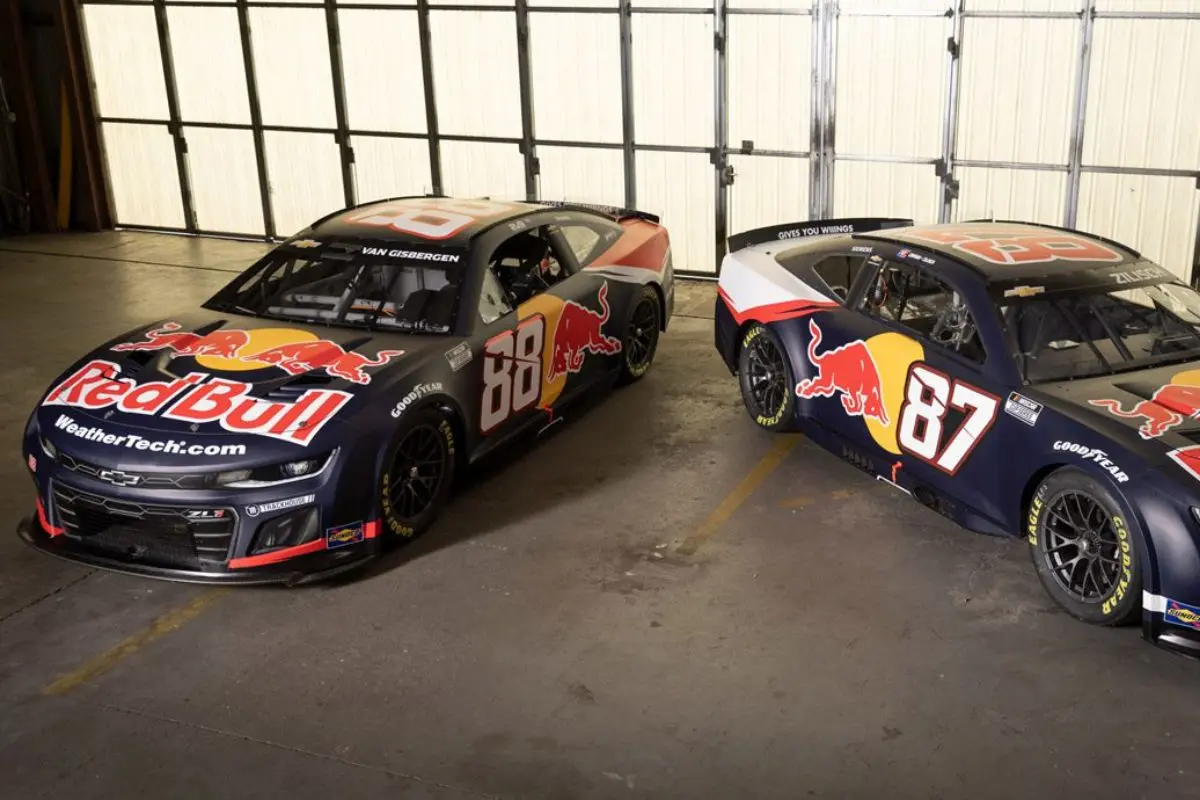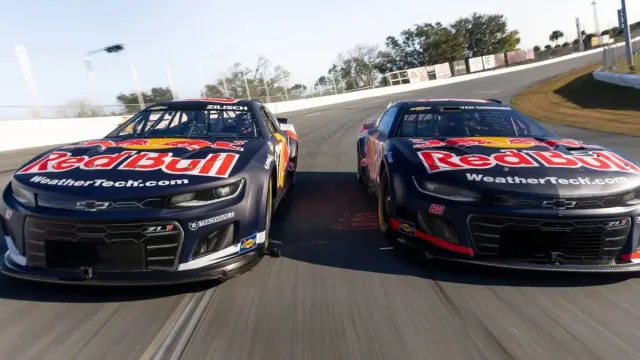NASCAR Drivers who drove Red Bull cars made a mark that fans still talk about today. Red Bull Racing had a unique run in NASCAR, with drivers who faced tough challenges and created memorable moments. Some struggled, others soared, but all left their mark on the sport in one way or another. From surprising victories to unforgettable finishes, their time in Red Bull cars changed the game.
Key Highlights
- Brian Vickers achieved Red Bull’s first NASCAR Cup Series victory, significantly impacting the team’s legacy in 2009.
- Kasey Kahne secured Red Bull’s final NASCAR victory in 2011, influencing the championship race and enhancing team prestige.
- Scott Speed transitioned from Formula 1, showcasing international talent in NASCAR with a notable fifth-place finish at Talladega.
- Bill Elliott, a veteran, briefly drove for Red Bull, highlighting the team’s blend of emerging and experienced talent.
- A.J. Allmendinger began his NASCAR career with Red Bull, achieving a top-ten finish and growing in the sport with Kaulig Racing.
Red Bull’s NASCAR Sponsorship History
Although Red Bull is widely recognized for its involvement in extreme sports and motorsports, its history in NASCAR has been marked by both ambition and challenges. The company’s initial foray into NASCAR began in the late 2000s with the establishment of its own team. Red Bull Racing entered the NASCAR Cup Series with aspirations of success, aligning with Toyota as their Original Equipment Manufacturer (OEM). This partnership was indicative of Red Bull’s tactical approach, utilizing Toyota’s engineering skill to gain a competitive edge on the track.
Red Bull Racing’s tenure in NASCAR spanned five years, a period characterized by ambitious goals yet hampered by inconsistent on-track performances. Despite a few notable moments, the team struggled to achieve the sustained success that Red Bull had experienced in other motorsport arenas. This struggle ultimately led to the decision to exit NASCAR in 2011. The departure was likely influenced by the team’s inability to meet performance expectations, which is a critical factor in a sport driven by results.
The recent announcement of Red Bull’s sponsorship of Trackhouse Racing for the 2025 NASCAR Cup Series season marks a considerable return to the sport. This new venture signals Red Bull’s renewed commitment to NASCAR, aiming to capitalize on past experiences to achieve greater success.
The sponsorship of Trackhouse Racing represents a tactical shift from team ownership to partnership, allowing Red Bull to utilize its brand without the operational complexities of managing a full-fledged racing team. This move may well redefine Red Bull’s legacy within NASCAR.

A.J. Allmendinger’s NASCAR Career with Red Bull
A.J. Allmendinger commenced his NASCAR Cup Series expedition with Team Red Bull, driving the No. 84 Toyota. His initial venture into the series was fraught with challenges, as evidenced by numerous did-not-qualify (DNQ) results during his debut season. These early struggles reflected the competitive nature of the NASCAR Cup Series and the hurdles faced by new teams and drivers trying to establish themselves.
Despite these difficulties, Allmendinger’s persistence was notable. His tenure with Red Bull Racing, while short-lived, did mark some high points, particularly in 2008. At Kansas Speedway, Allmendinger exhibited his racing skill, achieving his best finish with the team. Starting from the 14th position, he navigated the race with skill and resolve, ultimately securing a commendable ninth-place finish. This performance highlighted his potential and adaptability, even amidst the challenges of adapting to NASCAR’s premier series.
Unfortunately, the lack of consistent qualifying success with Red Bull led to Allmendinger’s eventual departure from the team. His career path took him to multiple teams before he found a more stable footing with Kaulig Racing.
Brian Vickers’ Victory with Red Bull
Brian Vickers etched his name into NASCAR history by securing Red Bull Racing‘s inaugural victory in the NASCAR Cup Series. This noteworthy achievement took place in 2009 at the Carfax 400, held at Michigan International Speedway. Vickers, piloting the No. 83 Toyota, showcased exceptional skill and strategy to clinch this remarkable win, which marked a milestone for both his career and the Red Bull Racing team.
Vickers’ victory was a reflection of his persistence and racing expertise, as he capitalized on a critical opportunity during the race. With only three laps remaining, Jimmie Johnson, a formidable contender, suffered a setback by running out of fuel. Vickers seized this moment to take the lead, demonstrating his readiness and quick decision-making. He then successfully fended off formidable competitors, including Jeff Gordon and Dale Earnhardt Jr., both of whom are renowned figures in NASCAR, to secure the victory.
This win was not only a personal achievement for Vickers but also a notable breakthrough for Red Bull Racing. It highlighted the team’s potential and solidified their presence in the highly competitive NASCAR Cup Series. Vickers’ success at Michigan International Speedway illustrated the synergy between driver and team, showcasing how perseverance and skill can lead to victory.
In his five-year tenure with Team Red Bull, Vickers’ victory at the Carfax 400 remains a defining moment. It was a crucial event that exemplified the competitive spirit of both the driver and the team, contributing a remarkable chapter to the legacy of Red Bull in NASCAR racing.

Kasey Kahne’s Win and Departure from Red Bull
Kasey Kahne, a notable figure in NASCAR, added another crucial chapter to Red Bull Racing’s brief but impactful history by securing their alternate and final victory in the NASCAR Cup Series. Kahne clinched victory at the penultimate race of the 2011 season in Phoenix, a win that greatly influenced the championship race between Tony Stewart and Carl Edwards. This success marked Red Bull’s second win in NASCAR, establishing Kahne as a driver capable of delivering results under strain.
Kahne’s tenure with Red Bull was short-lived, as he only competed for the team during the 2011 season. Despite the brevity of his stay, the impact of his performance was profound, with his win being a highlight of Red Bull Racing’s NASCAR expedition. Following the end of the 2011 season, Red Bull Racing ceased operations, prompting Kahne to shift to Hendrick Motorsports, where he joined a roster of esteemed drivers.
Shifting to Hendrick Motorsports was a crucial moment in Kahne’s career, aligning him with acclaimed racers such as Jimmie Johnson, Jeff Gordon, and Dale Earnhardt Jr. This move enabled him to further hone his skills and compete at the highest level of NASCAR.
Kahne’s legacy with Red Bull remains defined by his Phoenix victory, a reflection of his driving skill and ability to make decisive contributions to a team’s history, even in a limited timeframe.
Other Notable Red Bull Drivers in NASCAR
Red Bull Racing’s brief tenure in NASCAR was marked not only by Kasey Kahne’s memorable victory but also by showcasing other remarkable talents. Among these drivers were Scott Speed and Bill Elliott, each leaving a distinct imprint on the team’s history.
Scott Speed brought a unique flair to Red Bull Racing, shifting from Formula 1 with Scuderia Toro Rosso to NASCAR in the No. 82 Toyota. His skill was particularly evident at Talladega Superspeedway in 2009, where Speed achieved his best finish—an impressive fifth place—amidst the chaos of a dramatic crash involving Carl Edwards.
Bill Elliott, the 1988 NASCAR champion, made a brief appearance with Team Red Bull, driving the No. 83 Victory Junction Gang Dodge in 2006. Despite his illustrious career, Elliott faced challenges with the team, particularly failing to qualify for the Bank of America 500 at Lowe’s Motor Speedway.
However, his presence highlighted Red Bull’s commitment to involving seasoned veterans in their NASCAR pursuits.
Significant highlights from their tenure include:
- Scott Speed’s Shift: From Formula 1 to NASCAR, showcasing versatility.
- Talladega Success: Speed’s top-five finish, emphasizing potential in high-stakes races.
- Bill Elliott’s Involvement: Bringing championship pedigree to the team.
- Challenges Faced: Elliott’s struggles with qualifying, illustrating NASCAR’s competitive nature.

News in Brief: NASCAR Drivers Who Drove Red Bull Cars
Red Bull’s foray into NASCAR left a lasting impact through its sponsorship and support of talented drivers. A.J. Allmendinger’s tenure displayed potential, while Brian Vickers achieved a notable victory, further cementing Red Bull’s influence in the sport.
Kasey Kahne’s win and subsequent departure highlighted the team’s ability to attract and nurture skilled competitors. Collectively, these drivers contributed to Red Bull’s legacy in NASCAR, demonstrating the brand’s commitment to fostering competitive racing talent within the series.
